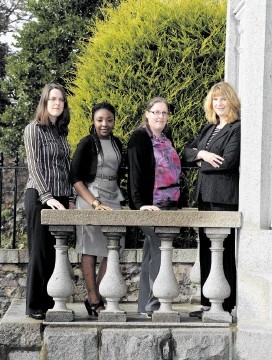
Optimus is proving that oil and gas engineering isn’t a man’s world with its latest influx of graduates. The consultancy has taken on two female graduates and offered a job to a third chemical engineering student for when she graduates next summer.
Ciara Mulligan, 25, started work at the oil and gas engineering consultancy as a graduate structural engineer on October 1, while Abigail Mshelbwala, 24, also recently joined the ranks as a graduate process engineer.
They are paving the way for Francine Chidi. She has been offered a job with Optimus after she graduates from Edinburgh University next year following a successful chemical engineering work experience placement the 23-year-old undertook with the firm from June to August.
The trio will follow in the footsteps of Louise Watson, 23, a civil engineering graduate who joined the firm in January as a graduate structural engineer.
Miss Watson said: “The ethos of Optimus really appealed to me. The company has a practical, commonsense attitude towards engineering and a wealth of experience to draw on, with plenty of opportunities for my career development.
“I didn’t know what to expect in the beginning, but it’s been a great start to my career. Optimus’ graduate training programme ensures that I, and other graduate trainees like me, get a rounded education in offshore engineering. I’ve been involved with a number of projects and have already been given the chance to manage part of an offshore project, with guidance from the senior engineers.”
The latest recruits take to seven the number of female graduates Optimus has taken on in the past six years – 35% of the 20 grads recruited overall.
Ian Bell, founder and director of Optimus, said: “Our trainees are a cosmopolitan mixture of both sexes: we recognise skill and talent regardless of gender.
“The oil and gas industry, particularly in areas such as engineering, has traditionally been dominated by men, but the barriers to female engineers are lifting. At Optimus, we’re proving that it’s just as attractive a career for young women.”
Overall, eight graduates and trainees are entering the world of work at Optimus this year – five chemical engineers, two structural engineers and one apprentice who will be given a taste of various project support roles – taking its workforce to 85, 31% of which is made up of women. Almost one quarter (24%) of technical staff are female (19 out of 78).
The company’s most successful graduate trainee is also female. Mary Shepherd, 28, joined Optimus in 2006 after graduating with a Masters in chemical engineering at Heriot-Watt University in Edinburgh. She has since attained Chartered status from the Institute of Chemical Engineers, been promoted to a senior process engineer and travelled to far-flung parts of the world with her work – Canada, Egypt, Bulgaria, Thailand, Monaco and Holland.
“Optimus has allowed me to have a varied career and to gain a lot of experience in a relatively short time,” she said. “I’ve been seconded in a development engineering role to an energy operator for a few months and had a gradual increase in running my own jobs.
“During my time with Optimus there has been continual recruitment of female engineers in all disciplines. I think there is a slow increase in the number of women in engineering, but it’s still an overlooked career option at school level and more effort could be put into encouraging females to study engineering,” added Miss Shepherd.
According to the Institution of Engineering and Technology’s 2012 annual workforce survey, only 6% of the engineering workforce is female – a level that has remained consistently low over the past five years. The IET has called for more girls to be encouraged into engineering careers at a younger age.
Sarah Innes, resources manager at Optimus, said the engineering consultancy gave two school pupils a week’s work experience during the summer – one boy and one girl – both of whom are now applying for engineering degrees. It will host two more during the October holidays, again one boy and one girl.
Attracting more girls into engineering would help address skills shortages and boost the UK economy, she said. “A recent study by accountants PwC shows that the oil and gas industry in Aberdeen needs 120,000 recruits if it is to realise its full potential and the engineering sector is certainly grappling with a skills shortage,” she added.
“We aim to attract and retain the best people – male or female – by giving those starting out excellent opportunities to learn and develop exciting and rewarding careers, as well as continually investing in our more experienced members of staff.
“The first degree doesn’t need to be the end of the story and we’re currently funding five members of staff through secondary degrees. Investing in our employees’ professional development is helping to cement our reputation for having a highly-skilled workforce.”